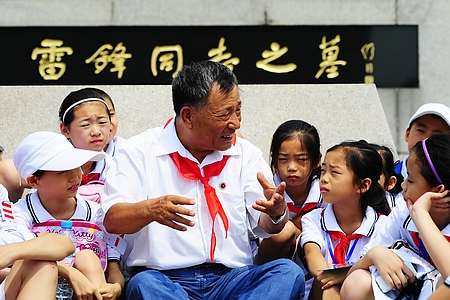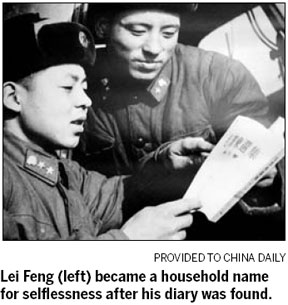Life and Leisure
Love lives on
By Qiu Bo (China Daily)
Updated: 2010-08-18 14:46
 |
Large Medium Small |
The best friend of late national hero, Lei Feng, says remorse over driving during the accident that caused Lei's accidental death has motivated him to commit his life to honoring the altruistic icon. Qiu Bo reports

Nearly 40 years after Lei Feng's death, his best friend Qiao Anshan tries to pass on the torch of altruism to the younger generation. Ren Yong / Xin Hua |
Guilt over his involvement in the accidental death of Lei Feng, a household name synonymous with selflessness, pushes his best friend Qiao Anshan to keep the hero's legacy alive. The 70-year-old retiree has spent the past 15 years lecturing about Lei's virtuousness throughout the country.
Qiao occasionally skips a day of speaking, he says, but never misses Aug 15 - the day Lei died in a truck accident in Fushun, when Qiao was behind the wheel.
The vehicle hit the wooden pole of a laundry line, which crashed down on the forehead of Lei, who was yelling directions.
Lei died in Qiao's arms.
"It was a tragic accident. If Lei had by chance been standing just a little further in any other direction, he would have been fine," Qiao says, sadly.
Qiao stayed in the mortuary with Lei's body for days.
"He was my best friend," Qiao recalls.
"He had a doll face and a strong southern accent. Some jerks would make fun of his accent, but he never got angry or was even annoyed. He treated everyone kindly."
Lei's diary was discovered soon after his death. His autobiographical accounts of his desire to serve the people and the Party led late Chairman Mao Zedong to call for people to "learn from Comrade Lei Feng". Nearly half a century later, the campaign remains ongoing.
"The more glorified Lei becomes, the guiltier I feel," Qiao says, even though he is not legally responsible for Lei's death.
Qiao spent nearly three decades after the accident in reclusive despair, grappling with feelings of pain and guilt.
He moved out of Fushun three years after Lei's death and didn't return until 1998.
Since then, he has followed his friend's example, committing himself to doing good for others without expecting any reward.
"I hope Lei Feng will live on," he says.
But by the 1990s, Lei had become more of a tall tale than a true legend because of the abundance of exaggeration and ubiquitous use of his image in propaganda during the "cultural revolution" (1966-76).
Many viewed Lei's legacy as out of date in the age of the prosperous market economy and glitzy skyscrapers.
During this decline in veneration of the ethos Lei came to represent, a former military chief persuaded Qiao to reveal the real Lei to the world.
"My motivation was to remove their prejudice and misunderstanding," he says.
Although Lei Feng and Qiao had both worked in the Angang Steel Factory in Anshan, Liaoning, they didn't meet until 1960, when both joined the same squad of the PLA.
"He was the last one to move in the dorm of six. We remained best friends," Qiao says proudly.
Qiao remembers many details in the four years they spent together. "Lei Feng was absolutely a selfless person and never said no to any requests," Qiao recalls.
Once Lei was washing his bed sheet when several naughty guys passed by and jokingly asked him to wash their sheets. Qiao was surprised to see that Lei took the joke seriously and happily washed their sheets.
"I reproached those guys and told them to never do such pranks, but Lei Feng said it's unnecessary," Qiao says. "He was that sort of guy who didn't like to blame others."
Lei Feng was also one of the few in the squad who could read and he always helped others to write letters to their families, Qiao recalls.
After the Beijing-based China Youth Daily ran the story about Qiao and Lei in 1995, screenwriter Wang Xingdong invited Qiao to coauthor a script for the film The Days Without Lei Feng.

Qiao refused.
"I didn't want anything to disrupt my tranquil life," he says.
But he changed his mind when Wang accused him of being selfish - "not at all like his best friend Lei Feng".
Qiao became a consultant for the movie and conveyed Lei's manners of expression, based on his firsthand experiences, to lead actor Wu Jun.
"Wu reminded me of my best friend. He looks so much like Lei Feng, especially when viewed from the side," Qiao says.
The movie dominated the country's box office for months, bringing Qiao into the media spotlight.
He has since been inundated with lecture requests, as well as accusations.
"One time, when I gave a lecture in Tieling (in Liaoning), a man in the audience pointed at me and yelled: 'Look, he's the man who killed Lei Feng!'" Qiao recalls.
The words hit Qiao so hard that he fainted and had to receive first aid.
The controversy finally died down in 2003, when Shi Baoguang, an officer who investigated the cause of Lei Feng's death when the accident happened in 1962, affirmed Qiao's innocence.
"I can't interfere with my critics' freedom of expression, but I am consoled by a clear conscience," Qiao says.
He and his family moved back to Fushun at the city government's invitation 12 years ago.
Rather than resting during his retirement, Qiao has toured the country to promote "the spirit of Lei Feng" for six to eight months a year.
His life priority, he says, is helping people understand his old friend.
"The spirit of Lei Feng is definitely philanthropic," Qiao says.
"It is a selfless love and gratitude for your country, your family and your friends, and will never be out of date."